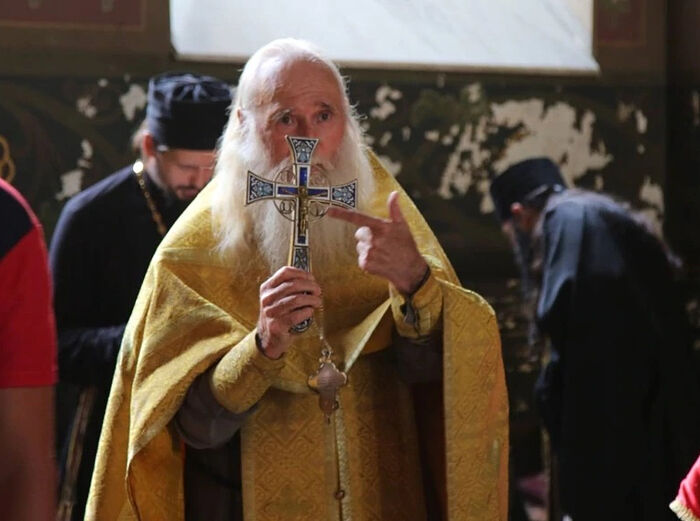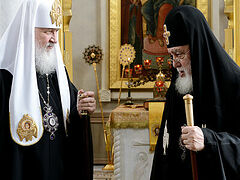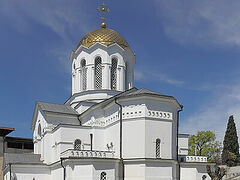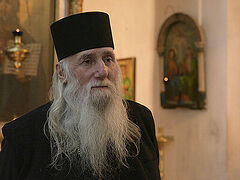Sukhumi, Abkhazia, October 25, 2021
The Georgian Patriarchate has no canonical authority in Abkhazia, believes the self-styled “Abkhazian Orthodox Church,” and thus it has proclaimed the restoration of the ancient Abkhazian Catholicate.
According to the Church Council of the “Abkhazian Church,” led by Fr. Vissarion Apliaa, the restoration of the Catholicate, which existed as separate from the Georgian Church from the 1470s to 1814, is aimed at “correcting the mistakes that were made regarding the canonical status of the Abkhazian Church.”
The Abkhazian Church Council declared its intentions in a recent address to His Holiness Patriarch Ilia of Georgia and His Holiness Patriarch Kirill of Moscow.
“The Abkhazian Orthodox Church declares that it does not want to have a fraternal spiritual connection with those who, contrary to the Gospel truth, consider Abkhazia to be the canonical territory of the Georgian Orthodox Church,” the Council declares, calling on all Local Churches to “investigate the canonical status of the Abkhazian Orthodox Church with the help of canonical Orthodox Church law.”
In response, while “categorically disagreeing with the content and spirit of the address,” the Georgian Patriarchate invited Fr. Vissarion to Tbilisi for the “beginning of a dialogue.”
In February, the “Abkhazian Church” suspended all services in an effort to force a resolution to its status. In response, the Georgian Patriarchate reminded that Apliia was, in fact, ordained by Pat. Ilia, and that Abkhazia is universally recognized as the canonical territory of the Georgian Church, and thus the canonical status there is a matter for the Georgian Church to resolve.
Apliia and his group have petitioned several times to be received into the Russian Church, but the Russian Church has always maintained that Abkhazia, and also South Ossetia, are the canonical territory of the Georgian Orthodox Church.
And despite the Georgian Church’s invitation, he continues to maintain that “the issue is not decided in Tbilisi,” but rather in Moscow, as he recently said on Abkhaz TV. In his view, the invitation is just another “deceit” from the Georgian Church.
***
The Abkhazian Catholicate existed from the first millennium, and as an independent structure from the 1470s, until 1814, when, following the conquest of Imereti by Imperial Russia, the Catholicate was made part of the Russian Church’s Georgian Exarchate.
After the restoration of the Georgian Church’s autocephaly in 1917, it established the Diocese of Tskhum-Abkhazia, and from 1921 to 1993, this diocese was always under the jurisdiction of the Georgian Orthodox Church. The Russian Holy Synod recognized the Diocese of Tskhum-Abkhazia as an integral part of the Georgian Church when it recognized its restored autocephaly in 1943.
Fr. Vissarion Apliaa was voted as the interim administrator of the Diocese of Sukhumi and Abkhazia of the Georgian Orthodox Church after the Georgian-Abkhazian war of 1992-1993 that resulted in most Georgian clergy being expelled for political reasons. Following the events of 2008, Georgian clergy were finally expelled from Abkhazia.
Fr. Vissarion then registered a new church structure in 2009—the “Abkhazian Orthodox Church,” with an unregulated and self-proclaimed autonomous status, separate from the Georgian Church—a de facto schism. However, the Georgian Church has not placed any canonical sanctions upon Fr. Vissarion and the other clergy so as not to deprive the Abkhazian faithful of the Holy Mysteries.
Both the Georgian and Russian Churches formally consider Fr. Vissarion still a member of the Georgian Church.
Follow us on Facebook, Twitter, Vkontakte, Telegram, WhatsApp, MeWe, and Gab!





